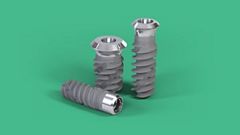Basel, 7 March 2011: Straumann today announced that its Bone Level dental implant has received approval from the Ministry of Health, Labor and Welfare in Japan and will become available there on 22 March 2011.
Introduced in initial markets at the end of 2007, the Straumann Bone Level implant complements the company’s range of highly successful Soft Tissue Level Implants. The Bone Level range is now available in all key implant markets and has become an important contributor to the Group’s growth. It has enabled Straumann to win new customers in addition to providing a complete range to existing clients.
The Straumann Bone Level Implant comes in three diameters and four lengths and addresses a broad range of tooth replacement indications. There is a full matching prosthetic portfolio comprising more than 120 components, each carefully designed for simplicity, reliability and esthetic performance. The new implant is available in Japan with Straumann’s renowned SLA surface technology, which is supported by 10-year clinical data. Approvals for the SLActive and Roxolid versions are pending.
Bone or Soft Tissue Level?
Dental implants broadly fall into two categories, depending on the level at which they connect to the prosthetic components that carry the tooth crown. In the case of tissue level implants, which were pioneered by Straumann, the connection is at the level of the gum. With bone level designs, the prosthetic connection is underneath the gum at, or close to, the crest of the jaw bone. While advantages are claimed for each design, market research shows that the choice of implant type is driven mainly by user preference1. In Japan, which is one of the world’s largest dental implant markets, Straumann estimates that possibly as many as 80%2 of implants placed are bone level.
About Straumann
Headquartered in Basel, Switzerland, the Straumann Group (SIX: STMN) is a global leader in implant and restorative dentistry and oral tissue regeneration. In collaboration with leading clinics, research institutes and universities, Straumann researches, develops and manufactures dental implants, instruments, prosthetics and tissue regeneration products for use in tooth replacement and restoration solutions or to prevent tooth loss. Straumann currently employs approximately 2360 people worldwide and its products and services are available in more than 70 countries through its broad network of distribution subsidiaries and partners.
References
1 Straumann estimates based on available market data and independent reports
2 Japanese Committee of Dental Implant Suppliers, Millennium Research Group 2009, Straumann estimates





